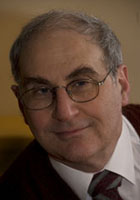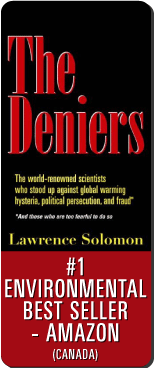Lawrence Solomon is one of Canada’s leading environmentalists. His book, The Conserver Solution (Doubleday), which popularized the Conserver Society concept in the late 1970s, became the manual for those interested in incorporating environmental factors into economic life.
An advisor to President Carter’s Task Force on the Global Environment (the Global 2000 Report) in the late 1970’s, he has since been at the forefront of movements to reform foreign aid, stop nuclear power expansion, save the world’s rainforests and convert free roads to toll roads. He is a columnist with National Post (Toronto) and has been a columnist for the Globe and Mail (Toronto), a syndicated columnist, a contributor to the Wall Street Journal, and the editor and publisher of the award-winning The Next City magazine.
He is author or co-author of seven books, including Energy Shock (Doubleday), In the Name of Progress (Doubleday), Breaking Up Ontario Hydro’s Monopoly (Energy Probe), Power at What Cost (Doubleday), Toronto Sprawls (University of Toronto Press) and, most recently, The Deniers (Richard Vigilante Books).
Mr. Solomon is a founder and managing director of Energy Probe Research Foundation and the executive director of its Energy Probe and Urban Renaissance Institute divisions. He also helped found the World Rainforest Movement, Friends of the Earth Canada, and Lake Ontario Waterkeepers.
Mr. Solomon’s 1982 model for electricity reform was adopted in the UK in 1989, leading to the demise of nuclear and coal power in the UK and its adoption of high efficiency natural gas technologies. His model has since become the dominant model for electricity sector restructuring in the world. His recommendations in the late 1980s and early 1990s for reforms inOntario’s natural gas sector contributed to an industry restructuring that yielded both economic and environmental benefits.
His 1996 model for the satellite tolling of roads has been adopted throughout the European Union. He holds patents for toll road technology for the EU, China, Singapore, Hong Kong, Mexico, and Brazil.
________________________________________________________________________
NORM RUBIN
Norm Rubin is Energy Probe’s director of nuclear research and senior policy analyst, and a founder of Energy Probe Research Foundation in 1979. One of Canada’s best-known environmentalists, he is a member of the Ontario Energy Board’s Working Group on Electricity Demand-Side Management and Demand Reduction, the Ontario Power Authority’s Conservation Business Stakeholder Advisory Group, and the Canadian Nuclear Safety Commission’s Non-Governmental Organization Regulatory Advisory Committee.
Atomic Energy Control Board (appearances before the board)
- “Canada’s nuclear nabobs try to turn green”, The National Post, May 20, 2000
- Risk Methodology and Criteria for a Nuclear Waste Disposal Facility, Evidence submitted to the federal Environmental Assessment of AECL’s Concept for Disposal of Canada’s Nuclear Fuel Waste, March 1996
- Risks of a Nuclear Fuel Waste Disposal Facility, Evidence submitted to the federal Environmental Assessment of AECL’s Concept for Disposal of Canada’s Nuclear Fuel Waste, August 1995
- How Many Cancers? Energy Probe’s Written Submissions to the Advisory Committee on Environmental Standards on Proposed Limits for Tritium in Drinking Water, February-April 1994
- Environmental Unacceptability and Environmental Regulation of Nuclear Power, Evidence submitted to the Ontario Environmental Assessment Board Hearing into Ontario Hydro’s Demand/Supply Plan, January 1993
- Investment Risks and Costs of Nuclear Plants and Other Megaprojects, Evidence submitted to the Ontario Environmental Assessment Board Hearing into Ontario Hydro’s Demand/Supply Plan, December 1992
- Statistical Confidence of Observed Childhood Leukemia Excesses Around Ontario’s Nuclear Facilities, Energy Probe 1991
- Electricity: Can It Ever Really Be Clean? Invited, published paper, Canadian Electrical Association’s Demand-Side Management Conference, Winnipeg, May 1990
- “Probability Times Consequence: Rational and Scientific, or Just Imprudent?” in Energy Alternatives: Benefits and Risks, H.D. Sharma, ed., (University of Waterloo Press 1990)
- “Profit an ally in environmental power struggle”, Globe & Mail, December 1, 1989
- Canada and Ontario’s International Standing in Energy and Electricity Efficiency, and the Relationship Between Low Electricity Prices and the Generation of Wealth, Energy Probe 1989
- The Role of Ontario Hydro’s Coal-Fired Exports in Acid-Gas Production, and Acid-Gas Control, Energy Probe 1989
- Too Cheap To Be True: Uncovering the Real Cost of Nuclear Electricity, Energy Probe 1989
- “Tritium: Canadian Content for the Bomb”, in The Name of the Chamber Was Peace, Science for Peace, ed (University of Toronto Press, 1988)
- “Don’tmake it unlikely, take it away”, in TRANSPO/88,vol. 11, no. 2, (Transport Canada 1988)
- Risks, Nuclear Safety, and the Ontario Nuclear Safety Review, Energy Proe 1987
- The Hazards of Old Reactors, co-author: Tom Slee, Energy Probe 1987
- “Tritium Exports: Building the U.S. Nuclear Arsenal”, in Science and Technology Dimensions, vo. 2, no. 2, April 1987
- The Mismanagement of Canada’s Nuclear Waste Management Program, Invited Brief to the Federal Standing Committee on Environment and Forestry, February 3, 1987
- “What Canadians Should Learn from Chernobyl”, in CAIRS Radiation Safety Bulletin, vol. 4, no. 2, (Canadian Institute for Radiation Safety 1986)
- “Canadian, Soviet reactors share flaws, researcher says” Ottawa Citizen, May 10, 1986
- From Hydro to the H-bomb”, The Hamilton Spectator, February 13, 1986
- Tritium, Bombs, and Ontario Hydro, Energy Probe 1985
- “Tories have pledged a full inquiry into nuclear industry”, Toronto Star, September 16, 1984
- Canada’s Domestic Nuclear Energy Industry: Is the Status Quo Morally Acceptable? Energy Probe 1984
- Canada’s International Nuclear Trade: The Economics and the Weapons Connection, Energy Probe 1984
- “Public seeks control over atomic board”, Winnipeg Free Press, December 22, 1983
- “CANDU design flaws in spotlight following Pickering leak”, Toronto Star, August 13
- “Doubts about CANDU safety”, Toronto Star, July 18, 1983
- “Hydrogen seen as a future energy source”, Winnipeg Free Press, May 4, 1983
- “Costs cloud future of fusion energy”, The Ottawa Citizen, February 5, 1983
- The Privilege of Participation: A brief to the Atomic Energy Control Board, co-author: David I. Poch, Energy Probe 1982
- “Atomic energy board’s future darkened by record in the past”, Toronto Star, May 24, 1982
- “Rational Anti-Nuke Puts Energy Problem in Perspective”, Canadian Consulting Engineer, April 1981
- The Propaganda Papers: Energy Probe’s Final Argument to the Ontario Energy Board, documenting the need to restrict Ontario Hydro’s public relations activities, Energy Probe 1980
- What Keeps Us From Freezing in the Dark: A Breakdown of Canada’s Secondary Energy Consumption by Fuel Type, 1977, Energy Probe 1980
- The Perils of Probabilities… A Brief to the Atomic Energy Control Board, Energy Probe 1979
- Feature articles on CANDU Reactor Exports, Diagnostic X-Rays, CO2, and CANDU Reactor Licensing Standards in The Probe Post (Pollution Probe Foundation, 1978-1979)
- News articles and reviews, ibid, 1978-1981
- CBC and CTV National News
- Canada AM
- Mid-Day
- The Fifth Estate
- Venture
- The Nature of Things
- The Great Debate
- Science Cafe
- Hosted ten episodes of TVOntario’s Fragile Nature, 1990-1991
Radio engagements too numerous to list individually, including:
- As It Happens
- Sunday Morning
- The House
- Commentary
- Morningside
- Ideas
- Quirks and Quarks









